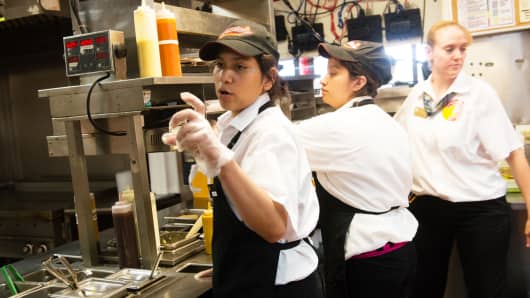According to the Bureau of Labor Statistics data, since the beginning of this year, the percentage of young Americans working or actively looking for work has been hitting historic lows. This was very consistent with what I'd heard so, I wrote an op-ed for the Wall Street Journal entitled "Why Young People Can't Find Work." That next day, Derek Thompson, an editor from The Atlantic, posted a rebuttal entitled "The Real Reason Young People Can't Find Jobs." Thompson criticized my op-ed for 1) not mentioning the recession as a reason why young people are out of work; 2) not understanding that college is a reason many young people aren't working; and, 3) not recognizing that young people have always had high rates of unemployment. I appreciate the fact that Thompson is engaging on this issue. Let's look at his three points.
Read MoreThe surprising reason millennials won't get hired
I didn't mention the recession as a reason for youth unemployment because it ended in July of 2009. I was writing about the current disturbingly low labor participation rates for Americans between the ages of 16 and 29. Of the historic lows I noted, all were well after the recession ended. One was from 2012, one was from 2013 and 11 were from 2014. In reality, the labor-participation rates for 16 to 29 years olds were all higher during the recession than they are now after five years of supposed recovery.
I did mention that there are 94,000 fewer people employed now than in May of 2008, while the employable population has increased by 14,217,000 people (virtually all of whom are now between the ages of 16 and 21). The supposed recovery is failing to produce jobs sufficient even to match population growth and, while the recession is long over, large numbers of young Americans are still unable to find jobs.
With regard to Thompson's point about college, more young people are choosing to pursue a higher education today than a generation or two ago. The question is: How many young people are going to college, or staying in college, because they can't find work? If the labor market were healthy, surely more young adults would, at the very least, prefer to work their way through college so as to graduate without crushing debt. But, to do so, they need jobs.
Read MoreHalf of grads still use the Bank of Mom and Dad
I invite Thompson to examine the BLS data for young people aged 25 to 29. By that age, most people have graduated from college and would like (or need) a job. In May, 18.5 percent of 20- to 24- year olds were in school and either unemployed or out of the labor force. That percentage drops down to 6 percent for 24- to 29- year olds. As I noted in my op-ed, the labor-participation rates for 25- to 29-year olds in April and May of this year were the lowest the BLS has recorded since it began collecting that data in 1982.
Finally, Thompson claims that young people can't find work because they're young, and young people have a harder time finding a job than older people. But young people have always been young; a 20-year old is no younger today than a 20 -ear old was 30 years ago. The point of my op-ed was that young people today are having a more difficult time finding jobs than people of the same age in the past.
To support his position that things aren't really getting worse for America's youth, Thompson offers a comparison between the unemployment rates for younger Americans and the overall unemployment rate. I didn't discuss unemployment rates because, in an era of declining labor participation, the official unemployment rate is a misleading statistic. The official rate fails to count people as unemployed if they've dropped out of the labor force. So, when the labor-participation rate is declining, the unemployment rate can improve even if the job market is getting worse.
Read MoreBest and worst countries for youth unemployment
For example, in April, the unemployment rate for the general population fell to 6.3 percent from 6.7 percent, even though 73,000 fewer people were employed in April than had been employed in March. In other words, the unemployment rate declined even though fewer people were working. It declined only because 806,000 people (basically the population of San Francisco) dropped out of the labor force. The youth unemployment rate may be holding steady but only because labor participation for America's youth is declining to historic lows.
We should all consider what these statistics mean for real people. They mean that a whole cohort of young adults is falling behind in their careers and may never catch up. Even if the economy somehow started producing jobs in an amount sufficient to absorb population growth, these young people would have to compete with even younger workers who have comparable experience and education, creating a real danger that they will never achieve their potential — that they will never have the same chance that I and others like me had when we were starting out.
That's why I'm so concerned.
Commentary by Andrew F. Puzder, CEO of CKE Restaurants Holdings. which owns Hardee's and Carl's Jr. He co-authored the book "Job Creation: How it Really Works and Why Government Doesn't Understand It." Follow him on Twitter @AndyPuzder.


